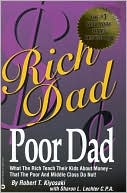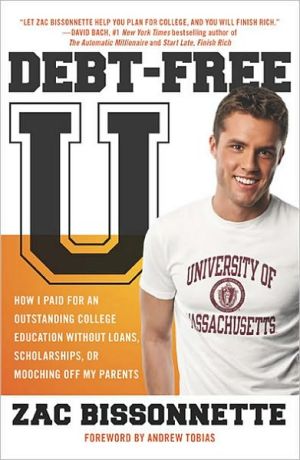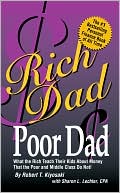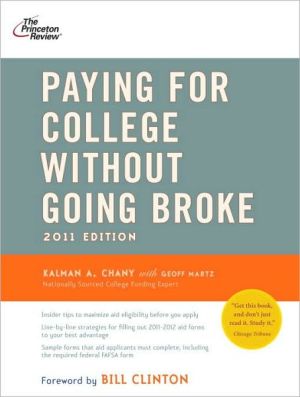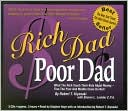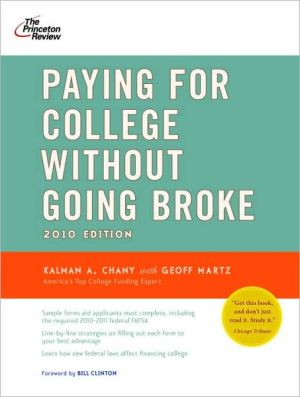Rich Dad, Poor Dad for Teens: The Secrets About Money--That You Don't Learn in School!
Following the highly successful Rich Dad Poor Dad, this edition is just for teens! Many teens are not taught good financial habits by their parents, and certainly don’t encounter them in school! It’s never too early to learn the secrets of managing money wisely, and even young people can learn how to make their money work for them. Thinking rich pays big, as rich dad will prove to this much younger audience, preparing them for a life better and richer than the one their parents had.
Search in google:
Following the highly successful Rich Dad Poor Dad, this edition is just for teens! Many teens are not taught good financial habits by their parents, and certainly don’t encounter them in school! It’s never too early to learn the secrets of managing money wisely, and even young people can learn how to make their money work for them. Thinking rich pays big, as rich dad will prove to this much younger audience, preparing them for a life better and richer than the one their parents had. Publishers Weekly Teenage capitalists may want to cash in on Rich Dad, Poor Dad for Teens: The Secrets About Money That You Don't Learn in School! by Robert Kiyosaki, with Sharon Lechter. Pitching the ideas from his adult bestseller Rich Dad, Poor Dad to a younger crowd, Kiyosaki recounts his youth and explains the origins of the book's title by contrasting his own "poor" father with his best friend's entrepreneurial "rich" father. "My dad seemed comfortable with his decision to be a `have-not,' but I knew that I wasn't." Kiyosaki encourages teenagers to analyze their learning style, offers moneymaking ideas and describes debt-related pitfalls. (Aug.) Copyright 2004 Reed Business Information.
Rich Dad Poor Dad for Teens\ \ By Robert T. Kiyosaki Sharon L. Lechter \ Little, Brown\ Copyright © 2004 Robert T. Kiyosaki and Sharon L. Lechter\ All right reserved.\ ISBN: 0-446-69321-9 \ \ \ Chapter One\ Financial Intelligence: A New Way of Learning\ You Are Smart\ First of all, let's get one thing straight: You are smart! I wanted to make sure you know that from the very beginning. When I was growing up, my dad always told me that everyone is born smart-that every child has a special kind of genius. I loved that idea. Even though I didn't always do well in school, I kind of knew the reason didn't have to do with me. I wasn't stupid. I just learned in a different way than the way teachers in school expected me to.\ My father taught me to have a good attitude about learning. He taught me to find my best way of learning. If I hadn't done that, I might have flunked out of high school or college. I probably wouldn't have been prepared for my financial life. And I wouldn't have had the confidence to be who I am today.\ We all learn differently. The trick is to find the way you learn best. When you do that, you'll discover your own personal genius.\ A genius is someone who excels at something. But a genius isn't necessarily good at everything. In fact, a genius usually has a special ability in one area while being pretty average in others.\ Did you know that Albert Einstein, who thought up the theory of relativity (E=[mc.sup.2]), never did well in school? He wasn't good at memorizing things, yet he grew up to become one of the greatest mathematical thinkers of all time. His brain focused on ideas rather than facts. Facts, he said, could be found in books, so he never felt the need to keep facts in his head. He wanted his head clear to think creatively.\ School asks us to keep facts in our head, but when we're out of school, we usually just need to know where the facts are kept so we can look them up or know whom to call when we need them!\ The way our performance is measured in school has very little to do with how intelligent we really are or how successful we can be. The way we perform in school is usually just a measure of how well we take tests! It's not a true measure of the genius you were born with.\ Everyone Is Born a Genius Take out your notebook again and write a list of people you know. Try to get to twenty names. Include people from school, family members, even teachers. Put your name at the top of the list. Next to each name write down what that person is good at, no matter what it is. Do you have a friend who can't sit still and is always tapping his foot to some beat that's inside his head? Write that down. Can your sister do the crossword puzzle in ten minutes using a pen without even once glancing at the dictionary? Write that down, too. Can you fix almost any computer problem? Put it in the book. This exercise helps you do a couple of things. It's the first time in your financial journey where you'll be asked to try to see something that you didn't see before-to look at something in a new way. Seeing talents in others you hadn't really recognized leads you to see your own talents. Knowing what your strengths are is one step toward success. Knowing how to detect other people's strengths is also a great skill, since creating a solid, reliable team is critical if you plan to build a business or be an investor someday.\ The Myth of IQ and Intelligence\ I remember that every once in a while in school, we'd have days when we were given all sorts of tests. The tests were described as "standardized." I was always puzzled by that idea. Every person is unique, so why were we all being evaluated in a cookie-cutter kind of way? The truth is that no two people are alike.\ Later I found out that the tests were measuring our IQ, which stands for "intelligence quotient." An IQ number is supposed to represent a person's ability to learn facts, skills, and ideas. But a person's IQ really boils down to this: It's a number that shows the relationship between a person's "mental age" (as measured on a standardized test) and his or her chronological (real) age. Then this number is multiplied by 100 and the result is your IQ. When I was growing up, people thought that an IQ stayed the same for a person's whole life. How limiting! Fortunately, that thinking is changing.\ Over the years I've done a lot of reading and research about intelligence, especially about the way people learn. IQ can relate to academics, but it can also relate to other things, like sports. When I was young, I had a high baseball IQ. My friend Andy had a very high academic IQ. Andy had an easier time learning in school because he learned by reading. I learned by doing something first and reading about it later. One formula worked for Andy, and another one worked for me. We each developed our own winning formula.\ Everyone Has a Special Learning Style\ In those IQ tests in school, only one type of intelligence was being measured: a person's aptitude, or talent, for words. But what if someone's not a word person? I don't especially like to read, so does that mean that I am stuck with a low IQ? Today, the answer is no. In 1983, a psychologist named Howard Gardner published a book called Frames of Mind (Basic Books). In it, he describes seven different types of intelligence, not just one. He also argues that people's IQ can change.\ Dr. Gardner's list of intelligences, which he also calls learning styles, has created a new road map for learning new skills and information, whether it's rocket science, threading a needle, or financial literacy.\ What's Your Learning Style?\ Take a look at this list. As you read it, think about what methods best describe your learning style. Circle the number that matches up for each of the learning styles: 1 is least like you and 5 is most like you.\ This is not a test. I repeat: This is not a test! There's no good or bad answer or high or low score. This is just a way to think about how you learn most comfortably.\ Verbal-linguistic intelligence If you always have a book tucked in your backpack, circle 5. This type of intelligence has to do with reading, writing, and language. It's also called being "word smart."\ 1 2 3 4 5\ Numerical intelligence If you're one of those people who can do a math problem in your head, circle 5. This intelligence is found in people who easily grasp data and numbers. They're also usually calm and rational thinkers.\ 1 2 3 4 5\ Spatial intelligence If doodling helps you listen in class, or if you're always seeing things that you'd like to photograph, circle 5. This intelligence is used to see patterns, designs, and space-and is found in many artists, architects, and choreographers who can visualize a two- or three-dimensional object or event and make it real.\ 1 2 3 4 5\ Musical intelligence Are you tapping a pencil or drumming your fingers right now? Head for the number 5. This type of intelligence is especially tuned in to sounds, rhythm, and rhymes.\ 1 2 3 4 5\ Physical intelligence If you love PE in school, or if your room looks like a sporting-goods store, you're physically intelligent-someone with awareness of how to use your body well, like many athletes and dancers.\ 1 2 3 4 5\ Interpersonal intelligence Do friendships seem effortless to you (mark 5) or endlessly complicated (mark 1)? Do you always (or never) know what your friends are thinking-or are you somewhere in between? Mark it down. This intelligence refers to the way someone gets along with other people, which is also called "being people smart."\ 1 2 3 4 5\ Intrapersonal intelligence If interpersonal intelligence is "being people smart," intrapersonal intelligence is "being self-smart," or self-aware. It's also called emotional intelligence, because it relates to the way you handle your emotions, such as fear and anger. Do you understand your own reactions to difficult situations and can you control them? Do you think before you talk back? Are you patient with your own shortcomings and do you take care of your self-esteem?\ 1 2 3 4 5\ Recently Dr. Gardner has come up with an eighth intelligence:\ Natural Intelligence describes a person's sensitivity to the world around him or her. If you enjoy being outdoors every weekend or are involved in school or community groups working for the environment, circle 5.\ 1 2 3 4 5\ I've talked a lot with a psychologist who taught innovative learning at Arizona State University about various learning styles and how they help us achieve personal and financial success. Listening to her thoughts, I've added one more intelligence:\ Vision is what determines who will be a leader and who will be a follower. Great leaders can see how a situation will play out and take action in response. Winston Churchill, Prime Minister of England during World War II, was one of the world leaders who was against the Nazis from the start. It's as if he could see the terrible things that would happen if they stayed in power. Those of you with crystal balls, mark 5.\ 1 2 3 4 5\ Do you notice a pattern to your numbers? Where did you rank yourself highest?\ If you ranked yourself a 4 or 5 in verbal-linguistic intelligence, It's likely that you are comfortable with reading and writing as tools for learning. If you ranked yourself a 4 or 5 in physical, musical, or natural intelligences, it's possible that you may have great success in "learning by doing"-using on-the-job training such as internships or being involved in school and community clubs. If you ranked yourself a 4 or 5 in spatial or numerical intelligences, you may benefit from learning through drawing, making charts and diagrams, building models, or working with your hands. If you ranked yourself a 4 or 5 in interpersonal or verbal-linguistic intelligences or vision, you may learn best by talking with friends or grown-ups about their experiences, by debating, or by performing. You'll find your intrapersonal intelligence useful in any type of training, since it will help you maintain your patience and self-esteem in the face of challenges.\ It's also possible that you ranked yourself high in several areas. That means that you'll be comfortable with "mixing and matching" different activities that work with your learning styles.\ But what if you didn't rank yourself high in any area? Are you doomed? Not at all. This exercise was designed to help you start to think about how you think. People who think about the future, who have "vision," for example, are likely to become good business leaders. But that doesn't necessarily mean they are now. If you don't feel you have vision now, don't panic. You can "pump up" any area if you're determined to exercise your brain, just like Rich Dad told me to do when I was a kid.\ If you're stronger in one area than others, there's a lot you can do to balance out. Here are some suggestions. What other ideas can you come up with?\ Talk about money at home and with your friends to develop your verbal-linguistic and interpersonal intelligences.\ Read about it! Lots of magazines about money and finance show how money works in real life, rather than in textbook math problems. The more you learn now about how the experts manage and invest their money, the more inspired you'll be to manage your own. (Verbal-linguistic and numerical intelligences)\ Write about it! Use your Rich Dad Journal to explore ideas about the role money plays in your life now and in the future. (Intrapersonal and verbal-linguistic intelligences and vision)\ If you get an allowance, take it seriously. Think of it as part of your income. Make up an invoice for your parents. Figure out ways to earn it and invest it. Manage your own money rather than treating your allowance as a handout. (Numerical and interpersonal intelligences)\ Do your own audit. Once a week, do an accounting of where your money has gone. (Numerical intelligence)\ Decide to become responsible for your future. Create a positive attitude about money. Envision the future for yourself. (Intrapersonal intelligence and vision)\ Finding Your Winning Formula\ Unfortunately, the style of learning that is taught in school may not always be the style you are most comfortable with. The ways in which we learn-which might be a combination of learning styles-add up to our winning formula.\ Let me return to the example of my friend Andy and me. As I said, I loved to play baseball. I had a high physical intelligence. I also loved to learn about players' statistics. I had a pretty good numerical intelligence. After I had learned all I could about the game from playing it, and had learned all I could about the players from other kids (interpersonal intelligence), I then turned to books to get more information. This style, of trying things out first and then reading about them later, has become my winning formula-one that I use to this day.\ My friend Andy's winning formula began with books. His strength was verbal-linguistic. He loved to read about and study things before he tried them out. He might have made a good manager for a baseball team while I would have made a good player. We were very different and we each figured out what worked best for us.\ Developing Your Financial IQ\ Are you beginning to see that any fears or stumbling blocks you may have about money may have to do with how you learn? If verbal-linguistics is not your thing, then, like me, you'll learn by doing and seeing. Later in this book I'll talk more about learning by doing, and you'll see some concepts explained through pictures and diagrams. Reading this book will also help you develop your intrapersonal intelligence by exploring your goals and fears-and by building your self-esteem.\ Rich Dad Q&A What do learning styles and winning formulas have to do with getting rich? I'll bet a lot of people who are voted "Most Likely to Succeed" every year in your school yearbook are the people with the best grades. While some of those people will eventually become successful, some of them may not. And it may very well be because they never learned financial intelligence. Many of them will be surpassed in wealth by people like you who are determined to find financial freedom. Discovering your learning style and your personal genius is the first step to having confidence-confidence that allows you to see and pursue opportunities, and to take risks.\ The road to a high financial IQ is to work on your money skills using the intelligences that work for you-and work to develop the others so that your whole brain is working full-steam. Try a few different learning styles on for size.\ \ (Continues...)\ \ \ \ Excerpted from Rich Dad Poor Dad for Teens by Robert T. Kiyosaki Sharon L. Lechter Copyright © 2004 by Robert T. Kiyosaki and Sharon L. Lechter. Excerpted by permission.\ All rights reserved. No part of this excerpt may be reproduced or reprinted without permission in writing from the publisher.\ Excerpts are provided by Dial-A-Book Inc. solely for the personal use of visitors to this web site. \ \
Introduction: Your Journey to Financial Freedom Begins Here1Rich Dad Poor Dad3Financial Literacy5Thinking in Numbers6School Is Just the Beginning7Journal: What Do I Want?9Part 1The Language of Money11Chapter 1Financial Intelligence: A New Way of Learning13You Are Smart13Everyone Is Born a Genius15The Myth of IQ and Intelligence16Everyone Has a Special Learning Style17What's Your Learning Style?17Finding Your Winning Formula22Developing Your Financial IQ23Rich Dad Q & A24Put Your Brain in Motion25Believe It26Part 2Rich Dad's Money Secrets27Chapter 2Rich Dad's Money Secret: The New Rules for Making Money29The Old Rules Don't Apply Anymore29The Rich Think Differently30A Magic Formula for Getting Rich?31A Moneymaking Scheme32Think Rich, Be Rich33What You Think Is What You Get34The Haves and the Have-Nots35Quiz: Are You a Team Player?36Rich Dad Q & A38Chapter 3Rich Dad's Money Secret: Work to Learn, Not to Earn39A Different Kind of Learning39My First Job39Standing Up to My Boss41Rich Dad Q & A43What Did Your First Job Teach You?44What It Means to Work45Create Your Own "Think Tank"47Chapter 4Rich Dad's Money Secret: "My Money Works for Me"49Life Is Filled with Surprises49A Comic Twist50A Surefire Business Opportunity51Is There a Business Opportunity Staring YOU in the Face?52Chapter 5Rich Dad's Money Secret: Create Money55Where Does Income Come From?55Types of Income56Rich Dad Q & A58The Only Thing You Need to Remember Is58Assets = Money in Your Pocket59Liabilities = Money out of Your Pocket60Asset or Liability?61Chapter 6Rich Dad's Money Secret: It's All About Cash Flow67Financial Statements: Reading the Numbers67The Cash Flow Pattern of an Asset69The Cash Flow Pattern of a Liability70Rich Dad Q & A71Create Your Own Financial Statement74Where Does Your Money Go?76Where Are You Financially?77Mind Your Own Business77Stretching the Dollar78Chapter 7Rich Dad's Money Secret: Play Games to Learn79Play to Learn!79From the Rat Race to the Fast Track81Rich Kid Smart Kid82CASHFLOW for KIDS at Home83CASHFLOW 10184Rich Dad Q & A85What Kind of Player Are You?86Learn to Make--and Create--Choices88Playing the Game of Life89Field Trips90Part 3Creating Your Own Cash Flow93Chapter 8Moneymaking Opportunities for Teens95Work to Learn, Not to Earn95What's the Right Job for You?97Work Is an Exchange98Rich Dad Q & A99Business Brainstorming100FYI: Things You Can't Do101Where to Look for Work102A Few Things About Your Paycheck103Ask an Expert/Find a Mentor104Chapter 9Managing Your Assets107The Piggy-Bank Approach107Piggy Bank #1 = Charity108Piggy Bank #2 = Savings109A Trip to the Bank110Piggy Bank #3 = Investments111Rich Dad Q & A111What Would You Do If You Got $1 Million?112Grow Your Money112Return on Investment113Pay Yourself First114Are You Rich Yet?115Chapter 10Managing Your Debt117Good Debt and Bad Debt117Credit Card Basics118The Downward Spiral118One Dollar at a Time120Conclusion: Your Financial Head Start123Choose Wisely!124The People You Spend Time with Are Your Future125What I Got from My Two Dads126A Strong Foundation127Super You129Glossary131About the Authors133The Foundation for Financial Literacy137
\ From Barnes & NobleAs Robert Kiyosaki asks, "Do you feel that what you're learning in school has nothing to do with your life? Do you feel that school's not really preparing you for the real world?" Now the author of the bestselling Rich Dad, Poor Dad has the answers for teens in this informative, inspirational guide, written with CPA Sharon Lechter. Tailoring their finance-driven message for a younger crowd, Kiyosaki and Lechter promise to teach teens the secrets of money-making success, including "financial intelligence," rules and methods for creating more money, how cash flows, and managing assets. The authors format their guide in easy-to-use, well-planned chapters, which incorporate quizzes, sidebars, diagrams, and a glossary, all intended to make understanding the complexities of money a breeze. For any teen looking to save money for big purchases or get a jump-start in financial independence, Kiyosaki and Lechter's primer is an exceptional place to begin.\ \ \ \ \ Publishers WeeklyTeenage capitalists may want to cash in on Rich Dad, Poor Dad for Teens: The Secrets About Money That You Don't Learn in School! by Robert Kiyosaki, with Sharon Lechter. Pitching the ideas from his adult bestseller Rich Dad, Poor Dad to a younger crowd, Kiyosaki recounts his youth and explains the origins of the book's title by contrasting his own "poor" father with his best friend's entrepreneurial "rich" father. "My dad seemed comfortable with his decision to be a `have-not,' but I knew that I wasn't." Kiyosaki encourages teenagers to analyze their learning style, offers moneymaking ideas and describes debt-related pitfalls. (Aug.) Copyright 2004 Reed Business Information.\ \ \ School Library JournalGr 6 Up-Kiyosaki, a bestselling author for adults, has specifically targeted teens in his attempt to promote his philosophy. What makes this book unique is his approach to how he thinks about accumulating wealth and about having money work for the earner. "Poor Dad" accepts the notion that he will never be rich and thinks that "money doesn't matter." "Rich Dad" thinks that "money is power." Teens are encouraged to be creative in developing ways to earn cash and to limit spending. A chapter on identifying individual strengths and learning styles while developing a financial IQ on the path to financial freedom is a lesson for any age. Sidebars and quizzes promote individual ideas and concepts. Teens will be attracted by the notion of playing games to learn more about acquiring assets and managing money. The glossary clearly explains financial terms. An entertaining and informative book.-Kathleen A. Nester, Downingtown High Ninth Grade Center, PA Copyright 2005 Reed Business Information.\ \

